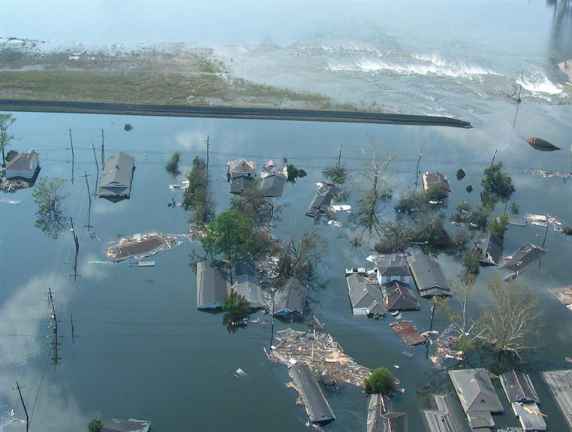
Inner Harbor, Florida Avenue, New Orleans (Image taken by the Army Corps of Engineers, Mississipi Valley Division.)
Hurricane Katrina: That Storm That Struck That Region
Timothy Horrigan; September 2005

Inner
Harbor, Florida Avenue, New Orleans (Image taken by the Army
Corps of Engineers, Mississipi
Valley Division.)
Like everyone else, I was horrified by the aftermath of Hurricane Katrina. The devastation is spread across four states. Even though some smaller towns to the east and south of the city are even worse off, the near-total destruction of the city of New Orleans qualifies as one of the worst catastrophes in our nation's history in and of itself. The last time a major American city was destroyed was 100 years earlier, when San Francisco burned down after an earthquake. Like San Francisco (which withstood an earthquake before being burned down when gas mains caught on fire), the damage in New Orleans was mostly caused by a secondary disaster: the damage from the hurricane itself was relatively manageable, but then several levees and flood walls failed on the Lake Pontchartrain side of the city. The flood is what did most of the damage. A tertiary catastrophe will be the political fallout from the disaster. The victims seen on TV were mostly black, and mostly poor, and many of them didn't remain quietly stoic in the face of their suffering (especially not after it became clear that the federal government had no plan for rescuing them or even for getting food and water to them.)
Hopefully, the City of New Orleans and the whole Gulf Coast will be rebuilt in a timely manner, and hopefully the local citizens will be allowed to lead the rebuilding effort. The people of New Orleans are being bussed and flown to makeshift shelters hundreds and even thousands of miles away, in scenes which are just a little too reminiscent for my taste of Hitler's cattle cars and concentration camps. So far, this is happening to the poor and the sick, but the middle-class citizens who were quote-unquote "smart" enough to evacuate will eventually max out their credit cards and get kicked out of their motel rooms— and they too will join the diaspora. And it is not exactly clear why quote-unquote "Those Folks" (to use Emperor Bush's favorite phraseology) who are still in "That Area" can't be used to help with the cleanup effort.
In any case, here are some places you can send help.
And if you prefer a slightly less establishment agency, here is a link to some smaller non-government organizations (NGO's) affiliated with the Global Health Council:
And here is a site with some excellent imagery of the disaster:
for more info:
![]() (March
13, 2006) The hapless former FEMA chief, Michael "Brownie"
Brown was the scapegoat for the disaster— and ironically he is the
only person on Bush II's team who learned anything from the
experience. On March 13, 2006, he was the guest on an interesting
edition of C-SPAN's Washington Journal. His post-Katrina remarks are
self-serving, but self-serving in a positive way: he does admit that
things went wrong, and he does make some useful suggestions about how
to avoid similar disasters in the future.
(March
13, 2006) The hapless former FEMA chief, Michael "Brownie"
Brown was the scapegoat for the disaster— and ironically he is the
only person on Bush II's team who learned anything from the
experience. On March 13, 2006, he was the guest on an interesting
edition of C-SPAN's Washington Journal. His post-Katrina remarks are
self-serving, but self-serving in a positive way: he does admit that
things went wrong, and he does make some useful suggestions about how
to avoid similar disasters in the future.
(June 8, 2006)
The official dates of Hurricane Katrina, according to the National Hurricane Center, were August 23-30 2005. It passed over South Florida on August 29 and made its final landfall near the mouth of the Pearl River on the Mississippi-Louisiana state line. at 1110 UTC (6:10 a.m. Central Daylight Time) on August 30. The worst damage in the New Orleans area happened after the storm had already gone by, when the levees broke. For more info:
National Hurricane Center: Tropical Cyclone Report: Hurricane Katrina (PDF format)
National Hurricane Center: Tropical Cyclone Report: Hurricane Rita (PDF format)
National Hurricane Center: 2005 Atlantic hurricane season chart (PDF format)
![]() Hurricane Katrina even effected the 2006 race for New Hampshire's
First Congressional District. An average Granite Stater named
Carol Shea-Porter went to Lousiana to help with hurricane relief.
She was apalled to find that the US government was (in her
words) "literally missing in action." State and local
government was there to help, all sorts of private-sector
oragnizations were there, and she even saw foreign governments.
But not the federal government. When she got back to New
Hampshire, she decided to run for Congress to change things.
Hurricane Katrina even effected the 2006 race for New Hampshire's
First Congressional District. An average Granite Stater named
Carol Shea-Porter went to Lousiana to help with hurricane relief.
She was apalled to find that the US government was (in her
words) "literally missing in action." State and local
government was there to help, all sorts of private-sector
oragnizations were there, and she even saw foreign governments.
But not the federal government. When she got back to New
Hampshire, she decided to run for Congress to change things.
See Also: